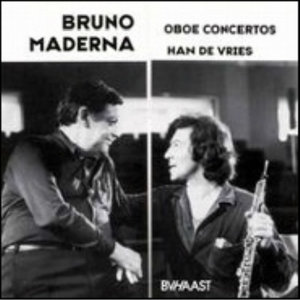
- 歌曲
- 时长
简介
by Thom Jurek Italian composer Bruno Maderna was one of the most misunderstood and mistreated of the 20th century's composers -- particularly by his peers. His vast body of work, ranging from his early works (at ten) to his later, introspective statements, reveal a man genuinely in touch with the inner wellspring of his own creative language, but also with the defining tonal and timbral capabilities -- as well as the idiosyncratic natures -- of the instruments he wrote for and their larger role in the articulation of the sound he not only aimed for, but commanded. The three oboe concertos presented here, featuring Han De Vries as soloist (and for whom No. 3 was written, and is conducted by the composer with Hilversum Radio Symphony), are perhaps the finest representations we have of Maderna's gorgeously intricate, subtle, and ultimately private musical language, rich with symbolism form the worlds of art, culture, religion, and politics. The first concerto, written in 1962 (and conducted here by Lucas Vis with the Kammermark Ruundfunk), showcases Maderna's total break with serialism, and the slowly developing relationship between spatial and chromatic priorities he was beginning to develop. There is deep lyricism in all of the oboe concertos, but nowhere is it more evident than here, with open tonal clusters meeting single notes played in the high registers against a harmonic backdrop of sinuous color and textural ambiance. Movement and stillness are complementary rather than antagonists of one another, and dynamics are held in tense, restrained intervals in order to allow melodic counterpoint to make its own way through the orchestral authority. In the "Concerto for Flute and Oboe" from 1969, Maderna's meta-linguistic personality, as well as his obsession with the music of the Far East, surfaces and is explored by the soloist against a cacophonous backdrop of gongs, marimbas, and violas, as well as hearty brass colorations. De Vries and Roberto Fabbriacini, on flute, play contrapuntal tonalities rather than melodies, offering different values to the diatonic and pentatonic scales before abandoning them altogether. Finally, in the gorgeous "Concerto for Oboe and Orchestra" from 1973, completed only months before Maderna's death, De Vries soars over the orchestra in a schematic of prelude, fugue, and resolution, with strings and brass creating a tightrope walk of elegiac drama based on an arpeggiated scale in E flat. In all, this is among the most haunting and stridently beautiful music of Maderna's fast catalogue of works. Sound is full and sharp without shrill overcompensation because of the analogue material, and De Vries is nothing short of a wonder in these fixed settings as he is in improvisational ones. There is not a more expressive player on the scene today. This disc is a must for Maderna disciples, and one to investigate for all who have an interest in late 20th century classical music.




![SCARLATTI, A.: Griselda (La) [Opera] [Mollet, Freni, Ratti, Rehfuss, Witsch, Haefliger, North German Radio Symphony, Maderna] [1960]](http://y.gtimg.cn/music/photo_new/T002R90x90M000003EerPJ0cVcJU.jpg?max_age=2592000)


